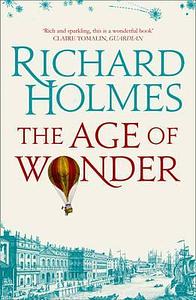Take a photo of a barcode or cover
171 reviews for:
Age of Wonder: How the Romantic Generation Discovered the Beauty and Terror of Science
Richard Holmes
171 reviews for:
Age of Wonder: How the Romantic Generation Discovered the Beauty and Terror of Science
Richard Holmes
Reconta a história da era pré-vitoriana da ciência, de maneira biográfica e muito gostosa de ler. Um dos melhores livros que li, com certeza
I adored this book. It is filled with great mini-biographies-- I especially liked the parts of William and Caroline Hershel (I knew nothing about Caroline before reading this). But to me one of the most relevant things about the book is that one of the things its about is the creation of the genre of science fiction. There is a chapter about Frankenstein, which is often thought of as the first real science fiction novel, but also it lets you see that the western European world is, even 200 years ago, becoming science fictional. Herschel and Davies both make forays into science fictional speculation. The book gave me a neat historical perspective into one of my favorite fiction genres.
Who would've thought poetry and science were so closely aligned? A great read for anyone who likes the Romantic poets.
Excellent telling of 18th century scientists. Excellent research into their lives, but sometimes a bit too much detail. The book got me excited about science an inspired a trip to the Museum of Natural History.
informative
inspiring
medium-paced
A terrific book. I didn't expect a series of detailed biographies, but that's largely what this is - Joseph Banks - 1st president of the Royal Society, Humphry Davy - his successor, and William Herschel - discoverer of Uranius, and builder of a 40ft reflecting telescope. Herschel was the first to develop the reflecting telescope. There are numerous other people covered, especially Herschel's sister, Caroline, and his son, John, Mongo Park, an early explorer of Africa, Michael Faraday, who began as Davy's assistant, a chapter on balloons, and Mary Shelley's Frankenstein. Other major figures who get some coverage include Captain Cook, Antoine Lavoisier, Pierre-Simon Laplace, Sir William Lawrence - the first prominent physician to deny the soul, Charles Babbage, Charles Darwin, Mary Sumner, and the romantic poets, Samuel T. Coleridg, Lord Byron, Percy Shelley, John Keats and the German poet Novalis.
Holmes makes his point at the end, that the history of science is over-simplified. That the ideas came of experiences and people that were complex and should be studies in depth. And it's in this light that he combines these detailed biographies. It seems strange from a distanct, but it was quite pleasant close up. I thoroughly enjoyed listening to it.
heart achingly beautiful account of some of the most important 18th-19th century scientists, who was maybe equally swept up by the romantic generation and the age of reason. wonderful marriage of ideas and histories. that first chapter of joseph banks reads like an actual novel.
The perfect bedtime book has taken me more than two years to slog through, because it is interesting enough to pick it up and read it, but boring enough that by the time I’ve finished a chapter, I’m ready to put it down and go to sleep. Fellow insomniacs, this one is for you.
I really enjoyed this book. History and science together!! The pace slowed a bit towards the end, and there were a few asides and opinions from the author that were a little weird, but overall very good.
A challenging read. I adored the first 2 chapters but have found that it's too difficult to read during summer months. It's not something you can really pop in and out of. I'll pick it up again this winter when I have time to park myself on the couch for a week and I'm not chasing kids and dogs all over the yard.
Holmes writes compellingly about the key figures in British Romantic-era science; his account is thorough and readable, the right amount of detail to provide a basic picture of the major developments and a starting-point for deeper exploration. If, like me, you're looking for the backdrop to Romantic literature and art, this is it.




